

Here Comes Apple’s Real Thermonuclear War Against Google. What's the key to Apple's success? Apple's weathered the economic downturn like almost no other company, pulling in massive profits without having to resort to deep price cuts.
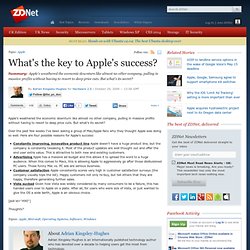
But what's its secret? Over the past few weeks I've been asking a group of Mac/Apple fans why they thought Apple was doing so well. Here are four possible reasons for Apple's success: Constantly improving, innovative product line Apple doesn't have a huge product line, but the company is constantly tweaking it. Most of the product updates are well thought out and offer the end user extra value. [poll id="490"] Thoughts? The Key to Apple's Success - Technorati Gadgets. The success of Apple's products is directly related to the hype surrounding a certain product.
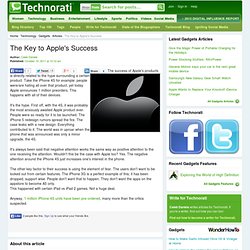
Take the iPhone 4S for example: people were/are hating all over that product, yet today Apple announces 1 million preorders. This happens with all of their devices. It's the hype. First off, with the 4S, it was probably the most anxiously awaited Apple product ever. People were so ready for it to be launched.
It's always been said that negative attention works the same way as positive attention to the one receiving the attention. The other key factor to their success is using the element of fear. Anyway, 1 million iPhone 4S units have been pre-ordered, many more than the critics suspected. Apple's Supply-Chain Secret? Hoard Lasers. About five years ago, Apple (AAPL) design guru Jony Ive decided he wanted a new feature for the next MacBook: a small dot of green light above the screen, shining through the computer’s aluminum casing to indicate when its camera was on.
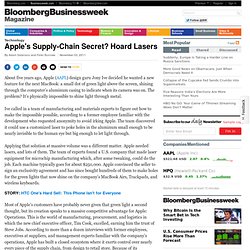
The problem? It’s physically impossible to shine light through metal. Ive called in a team of manufacturing and materials experts to figure out how to make the impossible possible, according to a former employee familiar with the development who requested anonymity to avoid irking Apple. The team discovered it could use a customized laser to poke holes in the aluminum small enough to be nearly invisible to the human eye but big enough to let light through. How Apple Uses its Supply Chain as a Strategic Weapon. Businessweek provides a very interesting look behind Apple's supply chain and how they have managed to fine tune their operations into a competitive advantage.
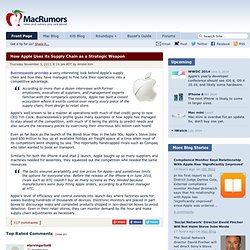
According to more than a dozen interviews with former employees, executives at suppliers, and management experts familiar with the company’s operations, Apple has built a closed ecosystem where it exerts control over nearly every piece of the supply chain, from design to retail store. Apple's well known to be a master at operations with much of that credit going to now CEO Tim Cook. Businessweek's profile gives many examples of how Apple has managed to stay ahead of the competition, with much of it being the ability to predict needs and also secure the necessary pieces by exercising their enormous $81 billion cash hoard. Similarly for both the iPhone 4 and iPad 2 launch, Apple bought up so many suppliers and machines needed for assembly, they squeezed out the competition who needed the same resources. Steve Jobs Offers Apple's Success Secrets to Nike CEO.
(Source: static.guim.co.uk) The key to Apple's success is elimination It's no secret that Apple is a wildly successful software/computing company.
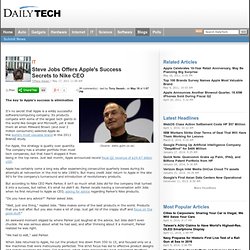
Its products compete with some of the largest tech giants in the world like Google and Microsoft, yet it beat them all when Millward Brown (and over 2 million consumers) selected Apple as the world's most valuable brand in the 2011 BrandZ study. For Apple, the strategy is quality over quantity. The company has a smaller portfolio than most tech companies, but that hasn't stopped it from being in the top ranks. Apple has certainly come a long way after experiencing consecutive quarterly losses during its attempts at reinvention in the mid to late 1990's. But according to Nike CEO Mark Parker, it isn't so much what Jobs did for the company that turned it into a success, but rather, it's what he didn't do. "Do you have any advice? " "Well, just one thing," replied Jobs.